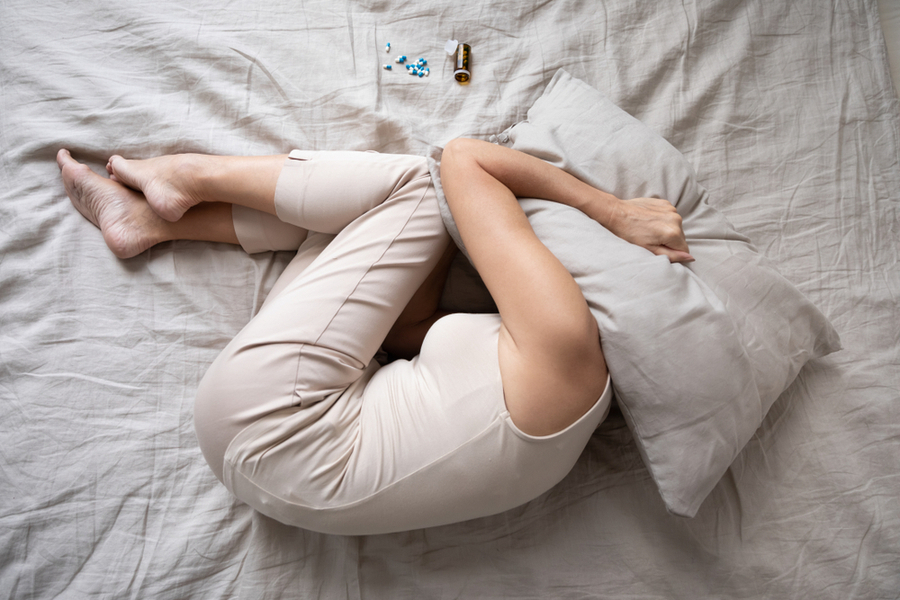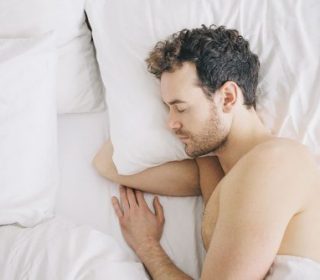How sleep (or lack of it) impacts your mental health – and how to cure your insomnia for good

Sleep, to me, is power. When I’ve got a solid, uninterrupted eight hours under my belt, I feel like I can take on the world. I’m ready, I’m raring. I will finally begin to write that novel I’ve never gotten around to. I’m on point for tackling that intimidating Zoom interview for that daunting commission from that new editor I could really do with impressing. I’m ready to take on the world’s injustices, and to have that long put-off talk to my kids about where babies really come from, all while putting a wash on and sweeping up the Shreddies that appear to be glued to the kitchen floor.
When I haven’t, I can barely take on the laundry, much less the world. My allotted wake-up time is 3.30am (seriously, it’s like clockwork). This is followed by 20 minutes of knowing I need a wee, hoping it’s going to go away, recognising it’s not going to go away because it hasn’t on any of the other 1,476 occasions this has happened, and finally surrendering to the call of nature.
Then, I return to bed for two hours of head-spinning anxiety overload, my brain over-processing all manner of things that barely mattered to me in daylight hours (sudden startled thought that I haven’t paid the kids’ subs for football club/I didn’t reply to that email/what if that mild sore throat I can feel is actually a rare form of cancer). Until I finally nod back off about 40 minutes before I actually need to get up. After which I feel achy, creaky and like I’ve been mentally run over by a double decker bus, which is never an ideal way to start any day.
On these days, the tasks in front of me feel overwhelming (aside from that of sitting on the sofa under a blanket drinking tea, eating crumpets and watching daytime telly. That I can manage, but I don’t have time for that and, as a do-er, I’d feel kinda rubbish about myself if I did). So I plough on through the foggy landscape of insomnia, feeling like even the chit-chat required of the school run is too much for my weary brain to handle, not being able to face the gym and eating stodge for a food hug.
There’s little doubt that sleep quality is inextricably linked to the state of my mental health. And I can’t be the only one. Sure, some of us can thrive on little sleep (we’re all thinking about how Mrs Thatcher only slept for four hours a night here) while others harness the power of a good nap (I have to say a lot of the most successful people I know are the sort who can put their head down and disco nap on a concrete floor if the need arises). I’m not one of them. I’ve never, ever developed the talent of napping, but, up until I hit 40, left to my own devices, I slept through the night like a dream (I’m not going to say slept like a baby because not being left to my own devices by my colic-y babies screaming blue murder was the only reason I wasn’t sleeping).
This, for me, is the decade of bad sleep. So many of my friends suffer the same plight, to the extent that I get 4am WhatsApps from fellow afflicted sleep chasers (and yes, I know phones should be banished from the bedroom and are the root of all evil). Dr Guy Meadows, co-founder and clinical lead of Sleep School says “Perimenopause and menopause are common triggers for insomnia in females. It is a time of significant hormonal, physical and psychological change leading to poor sleep. Managing hormonal change can have a significant impact on sleep quality.”
It is clearly hormone-related insomnia, courtesy of peri-menopause which, for me, brings with it a new-found anxiety. This, coupled with its fellow negative emotion buddy, stress, is why sleep eludes me – the outcome of which means an increase in, well, my anxiety and stress levels during the day. And there lies a vicious cycle sent to blight my mental wellbeing. I recently interviewed broadcaster and menopause expert Mariella Frostrup, a fellow insomnia sufferer, who said that she had such bad sleep issues during these hormonal changes that she even had anxiety-induced heart palpitations. Even now she is in her late 50s and post the menopause, the insomnia hasn’t gone away. So, what, pray tell, can be done?
I’ve tried all the textbook things. My issue isn’t falling asleep, it’s staying asleep. Sometimes I think it’s because I’ve drank all the wine, so I’ve tried not drinking all the wine. And still I’m awake. It’s linked to my cycle and I can’t sleep because my period is a-coming, I’ll decide. And then I’ll finish my period and have dreadful sleep for a week…
I’ve sprayed the lavender pillow sprays, rubbed in the magnesium oil, taken the herbal supplements and done the counting backwards from 300. The only thing that ever touches the sides is a certain over-the-counter medication that the pharmacist frowns at me each time I ask for, and you’re not supposed to take for any length of time. So, what other solutions are there?
Sleep School founder, Dr Guy’s top tips for better sleep
1 Stop struggling against your sleep
Sleep is a natural biological process that can’t be controlled and battled against – it could be likened to an endless game of tug of war, which only wakes you up more. Try Acceptance and Commitment Therapy (ACT), which proposes that the first step towards achieving better sleep is to accept that you’re awake. Once you can change the way you think and feel about not sleeping, you begin to remove the obstacles in the way of your sleep. ACT focuses on symptom acceptance and valued based action. The goal is to promote Psychological Flexibility, which is an individual’s willingness to experience negative thoughts, feelings and poor sleep, rather than get rid of them, in order to be able to move closer to what they care about in life. ACT recognises that pain and suffering is a normal part of the human experience and struggling to extinguish it can actually fuel it. ACT therefore focuses on changing the context in which people relate to their pain, rather than the content of the pain.
2 Rest in bed, if you wake in the night
Sleep is made up of three stages – light, deep and Rapid Eye Movement (REM) sleep. Each stage has a different job including growth and repair, mood regulation and memory processing. Human evolution has meant you cycle between all three sleep stages every 1.5 to 2 hours (hence why you wake at 3:30am every night!). It’s hypothesised that such brief awakenings are a survival mechanism, allowing us to check for danger. This explains why it is perfectly normal to wake in the night and why you might find yourself even more awake than normal during stressful times.
How you respond to night time waking determines whether you shift into a state of active wakefulness, akin to the daytime, or remain in quiet wakefulness, the bridge state to sleep. Unsurprisingly, engaging in daytime activities such as checking your emails or social media on your phone, switching on the light to read or or getting up to make a drink, all wake you up further. In contrast, choosing to stay in bed and rest in a state of quiet wakefulness offers many benefits similar to sleep including energy conservation, repair and memory consolidation. It also saves your valuable energy for the day ahead, helping you to get on with living your life.
3 Physicalise difficult emotions
Strong feelings such as anxiety, stress and frustration can make it difficult to sleep. Struggling to get rid of them only fuels them further and wakes us up more. ACT teaches us how to change the way we think and feel about our difficult emotions, rather than trying to change them. A simple way to do this is to look at your emotions as they arise in your body and give them physical attributes such as a shape, size, weight, colour and texture. For example, you might say ‘My anxiety feels like a cold black knot tightening in my stomach’. Describing your emotions like this helps to take the emotion out of your emotions by seeing them for what they are – waves of feelings and sensations passing through your body. If practiced regularly it works to defuse the power they have over you and your sleep.
4 Calm the mind
A busy mind is the most commonly reported factor preventing us from falling asleep. Research shows that when we try to block out our thoughts, they come back stronger and in greater numbers. At Sleep School, we teach clients how to do the opposite, to notice and let go of thoughts, rather than trying to control them. The first step is to anchor the attention in the present moment by noticing the movement of the breath. Then when the mind wanders, which it will, you acknowledge this fact before returning your attention back onto the breath. Brain imaging research shows that repeatedly noticing the breath and letting go of thoughts strengthens a part of the brain responsible for calming down mental chatter. Aim to practice for a few minutes every day, as well as when you find yourself awake at night.
How to nap when you’ve never been able to
“The best time to nap is between noon and 3 pm, as this is when we all experience a natural dip in our alertness levels, making it easier to drift off. For best results, view napping as an opportunity to rest, not sleep,” explains Dr Guy. “In doing so, we lower the bar of expectation, benefit from resting and increase the likelihood of actually sleeping. It also helps to find a quiet and comfy space to lie down or sit. If you’ve had a poor night of sleep or simply need a post lunch energy boost, then take a power nap. The ideal duration is between 10 and 20 minutes, any longer and you’re likely to enter deep sleep, causing you to wake up feeling groggy.”
How to develop better sleep posture
“Sleep posture is the position of your body at night. It’s not something many people consider when it comes to trying to wake up rested and pain-free, yet good sleep posture helps your muscles and ligaments relax, allowing them to recover as you sleep. There’s a host of factors that impact how we sleep at night, from chronic pain to stress, but considering the position in which we sleep can unlock the secret to a great night’s sleep.We spend 26 hours of our lives sleeping, so you may as well help your body make the most of it,” says sleep posture expert James Leinhardt.
“Good sleep posture has immense benefits that extend beyond reducing neck and back pain in the morning, including improved digestion and circulation, lessened shoulder tension, boosted energy levels, increased lung capacity and core strength, as well as a very notable decrease in snoring, if this is something you struggle with.”
So what makes good sleep posture? Sleep on your side (either one is fine, but try to alternate from time to time). Keep your pillow height not too high and not too low – just right to fill the space between your mattress and your ear – and position a pillow between your knees and ankles. This will help your hips remain neutral and help you achieve the optimum sleep posture. The surface you sleep on will affect your night-time posture too. Many people sleep on mattresses and pillows that are too firm or too soft and, as a result, their body will try and move to accommodate the pressure this can build up. The less effort the body needs to support its night-time posture, the more time it will have to completely rest.
Get the Sleep School app here, for a free 7-day trial, then £29.99 for the year
More from BALANCE on how to sleep well here










